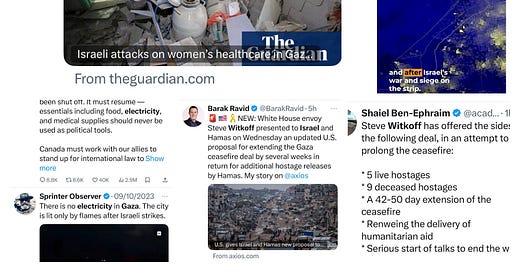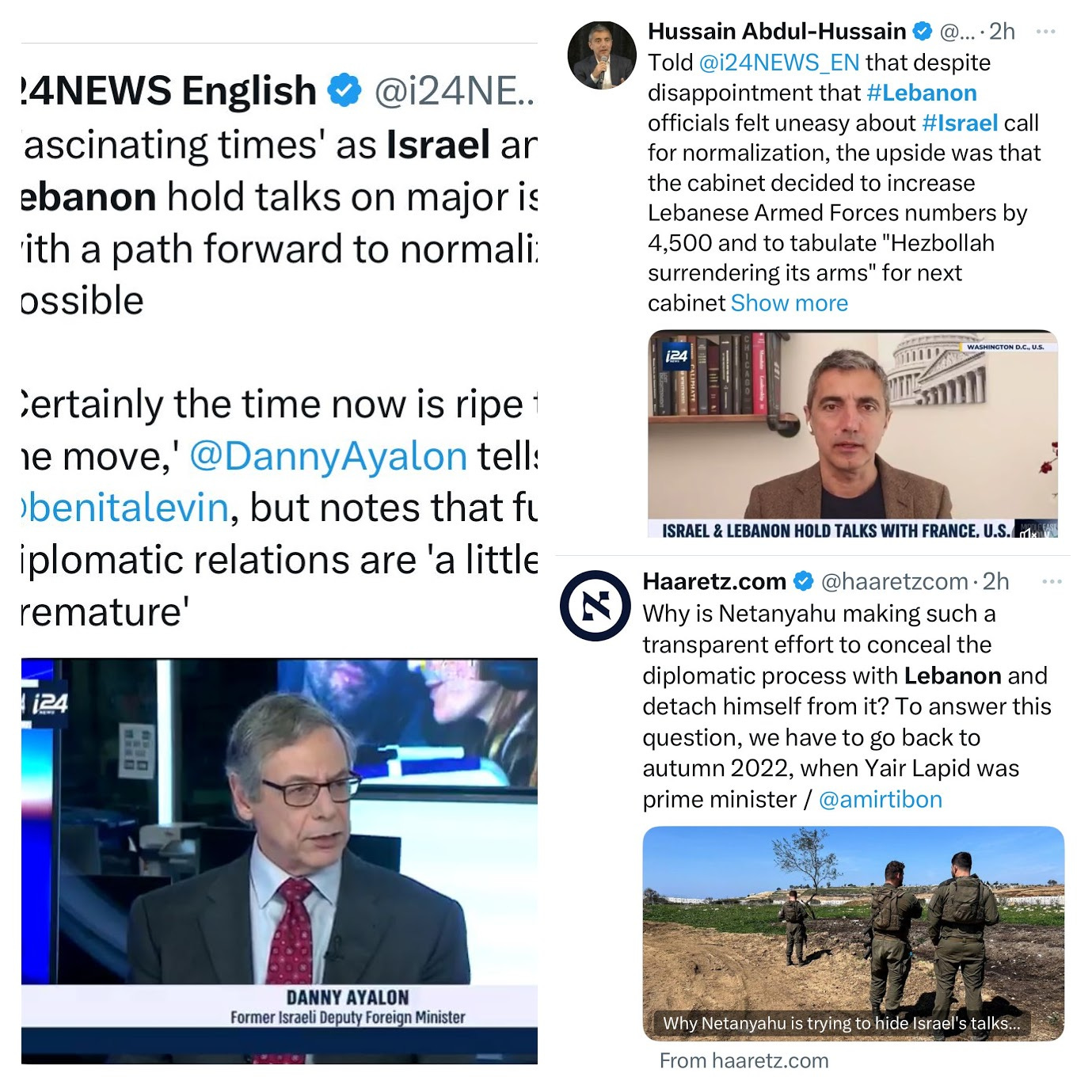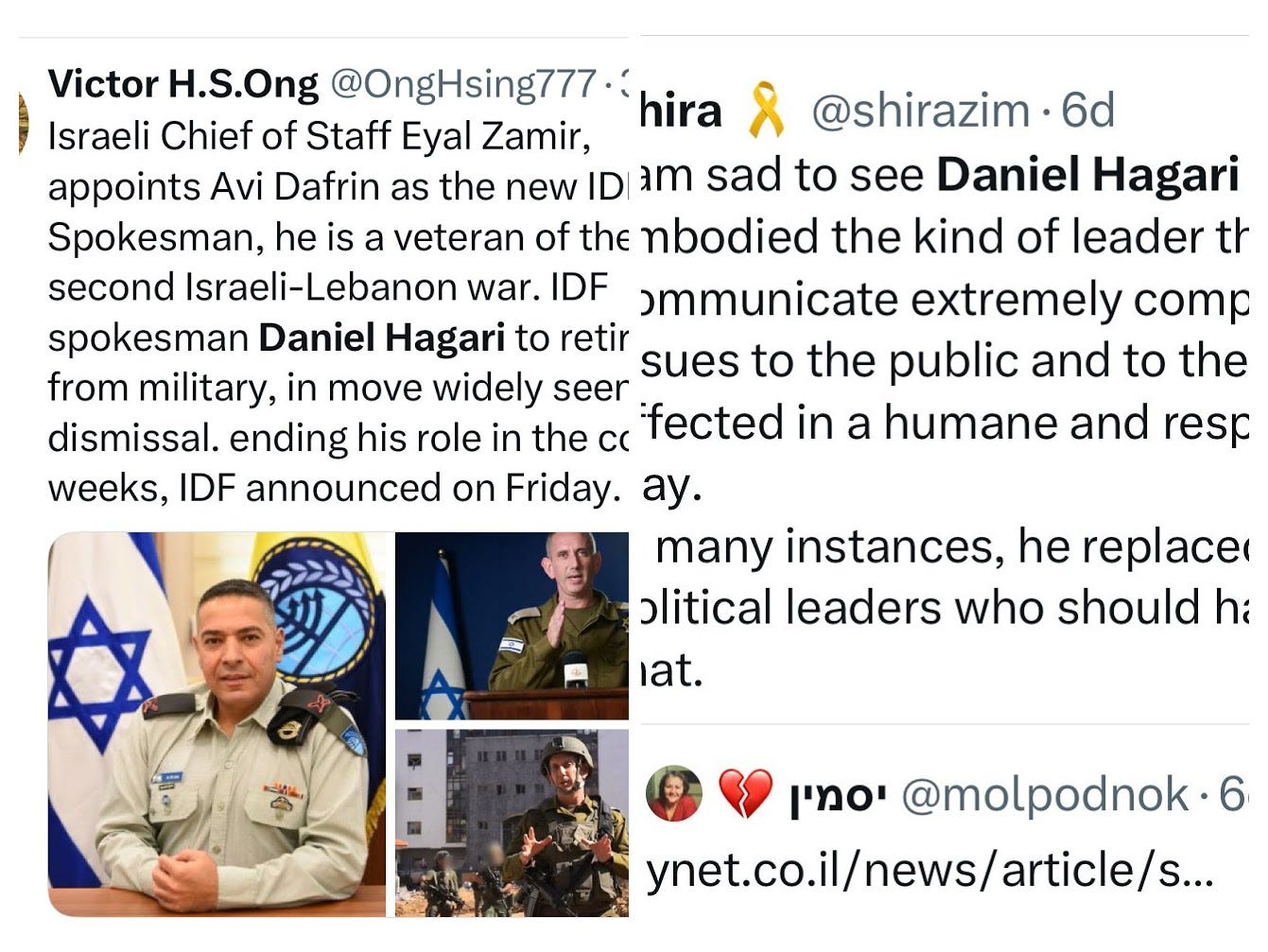Israel at War - Day 524
Gaza Ceasefire - Day 54
1. IDF Presents Findings of Investigation into Hamas Massacre in Nir Oz
Earlier this week, the IDF presented its investigation of the October 7 massacre to members of Kibbutz Nir Oz. Kibbutz Nir Oz became the symbol of the state’s failure to protect its citizens, with one in every four residents either killed or abducted by Hamas. The officer who conducted and presented the investigation provided the kibbutz residents with a detailed account and placed the murders, kidnappings, and battles on the kibbutz on a timeline and on a map.
Several kibbutz members said that while the investigation report was presented respectfully, it neither revealed new information, nor provided an explanation for the IDF’s failure to defend the kibbutz members. "In certain cases, there was a feeling that we knew more than they did," said one of the kibbutz members.
Former Chief of Staff Herzi Halevi and former Southern Command Colonel Yaron Finkelman were unusually present at the presentation of the investigation, and according to members of the kibbutz, the two told them that the IDF's failure in Nir Oz was the greatest failure in the history of the army. They asked for the kibbutz members' forgiveness and claimed that the IDF can now guarantee their safety there.
According to investigative media reports and the IDF report, the first security forces entered Kibbutz Nir Oz on the day of the massacre only after the Hamas fighters had already returned to the Gaza Strip. According to a major Israeli news outlet, the reports of what had happened on the kibbutz reached the division headquarters considerably later. Even when the reports reached headquarters and the Southern Command, there was no direct order to send forces to Nir Oz. The kibbutz remained without assistance even when the IDF gained control of several of the surrounding communities and sent forces to them. Senior IDF commanders in the southern region admitted in closed conversations with reporters that they “forgot” to send forces to Nir Oz
2. The War in Gaza and the Hostages Agreement
Israel is preparing to renew the war in Gaza, as the hostages agreement is frozen. After the release of 33 hostages during the last few weeks, PM Netanyahu decided not to proceed to the second phase of the agreement, that was supposed to start during the first phase, and eventually be concluded in ending the war with the withdrawal of all Israeli forces from the Gaza Strip. PM Netanyahu knows that if he agrees to end the war, his coalition will not hold. Two key parties, from the extreme right, have already announced that if Israel ends the war before destroying Hamas and achieving total victory, they will leave the coalition. 59 hostages are still held in Gaza, 24 of them are alive. All of the living hostages are male.
Meanwhile, Trump administration representatives are putting a lot of effort into the negotiations. President Trumps’ special envoy to the Middle East, Steve Witkoff, traveled to Qatar to try and close a deal. President Trump wants Hamas to release Israeli-Americans first. One of the living hostages and four dead ones have dual Israeli-American citizenship. On the table now is a suggestion that Hamas frees five Israeli-Americans. In return Israel will release Palestinian detainees and prisoners, and agree to a two month ceasefire. Israeli negotiators have also headed to Qatar. There is fear among families of Israeli hostages that once American hostages are freed, the US will lose its motivation to push for the release of the rest of the hostages.
Many of the hostage families are angry, since that would mean that the hostages that are not be released now, will have to stay in Gaza for much longer, and no one knows if they will be able to survive. Hostages that were released lately have testified that the conditions are extremely difficult, and that there is a shortage of food and clean water. They have also said that they were tortured, beaten and chained most of the time.
Families of hostages have decided to increase their protests. Last Saturday night they established an encampment near one of the entrances to the ministry of defense and the headquarters of the IDF in the middle of Tel Aviv. Many have spent the nights there, others come daily to support them, there is a large demonstration every evening, and the line of tents is growing every day.
Israel, on the other hand, decided to increase the pressure on Gaza. Israel stopped providing electricity to Gaza. This step disabled the only operational desalination plant in Gaza. There is currently hardly any clean water in Gaza. Israel also halted the supply of humanitarian aid to Gaza, all in order to put pressure on Hamas to go back to the negotiating table and be more flexible toward Israel.
In addition, the UN has issued a severe report, accusing Israel of genocidal acts and executing sexual violence in Gaza. Israeli officials have strongly rejected the accusations, saying it was an antisemitic report.
3. Israel and Lebanon Opened Negotiations
Israel and Lebanon opened negotiation talks to solve disputes on the international border between the two countries and establish an agreed upon border, based, if needed on small corrections.
Right now there is a ceasefire between the two countries. The Lebanese army is supposed to take control of the border with Israel and prevent Hizbollah operators and forces from returning to the villages on the border. It should, according to the ceasefire agreement, be a powerful force that would protect the border. If that is implemented and meets examination, Israel would withdraw its military forces from Lebanon back to Israel. The IDF still holds territories in southern Lebanon.
Israel called on its citizens to return to their homes in the north. Tens of thousands of people were evacuated from tens of communities in northern Israel immediately after October 7th, out of fear that Hizbollah from Lebanon will join Hamas and execute a powerful attack on Israel. Many are still afraid to return to their homes and they say they don’t feel safe enough, because they are not sure if the Lebanese army is strong enough to protect them, and they still don’t trust the Israeli army that failed to protect communities on the border with Gaza on October 7th.
It is important to say here that last September Israel assassinated Hizbollah’s iconic leader, Hassan Nasrallah in Beirut.
On Thursday the Israeli army launched an air strike targeting locations in northern Lebanon.
4. New Chief of Staff Fires IDF Spokesperson
One of the first policy decisions taken by the new army chief of staff, Eyal Zamir, was to nominate a new IDF spokesperson to replace Daniel Hagari, the current IDF spokesperson who became one of the iconic figures in Israel and the world. Hagari took office just a few months before October 7th 2023. Before that he was a decorated naval special operations officer, who participated in many confidential and heroic military operations.
On October 7th Hagari was the only one who took upon himself the duty to inform the public daily, live on television, and also explain what is going on in the war, when all other state agencies collapsed and did not address the needs of the devastated communities who were the survivors of October 7th massacre and abductions and evacuations.
Before Eyal Zamir took office as military chief of staff, one of PM Netanyahu’s close advisers, who is also a known media personality, Jacob Bardugo, strongly said that if Hagari will be promoted to general or stay in office, he will make sure that the minister of defense will not stay in office.
Brigadier general Hagari is highly appreciated by a majority of the Israeli people, and by the press corp in Israel and is very popular. But unfortunately, he said things that were not accepted by PM Netanyahu and his supporters. Many thought that major general Zamir was manipulated to push Hagari out of the army.
5. Music Video of Israel’s Song for the Eurovision Unveiled
Earlier this week, Israel’s Public Broadcasting Corporation, Kan 11, unveiled the country’s entry for the 2025 Eurovision contest, titled "New Day Will Rise." The song will be performed in mid-May in Switzerland by singer Yuval Rephael, who survived the Hamas attack at the Nova rave on October 7, 2023. Rephael, who sought refuge in a "death shelter" near the Nova rave site in the Gaza envelope, recently won the reality show "Next Star to the Eurovision."
The lyrics, written in Hebrew, English, and French, were crafted by Keren Peles, a celebrated singer-songwriter who also serves as a judge on the "Next Star" panel. The song was selected by a committee of seven members, all of whom voted unanimously in favor of her entry. However, the announcement of the chosen song has drawn significant criticism from several artists. In a letter to Israel's public broadcaster, Kan, they contended that Peles had an unfair advantage due to her dual role as a judge on "The Next Star for Eurovision" and her shared management of Yuval Rephael. In response to the backlash, the selection committee has stated that the protocol for choosing Israel's Eurovision entry will be revised starting next year.








